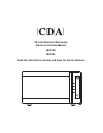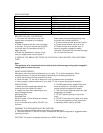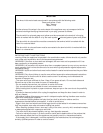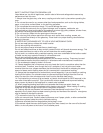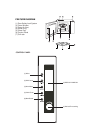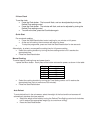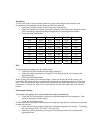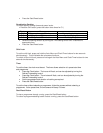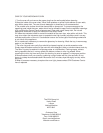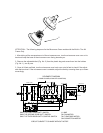SAFETY INSTRUCTIONS FOR GENERAL USE
Listed below are, as with all appliances, certain rules to follow and safeguards to assure top
performance from this oven:
1. Always have the glass tray, roller arms, coupling and roller track in place when operating the
oven.
2. Do not use the oven for any reason other than food preparation, such as for drying clothes,
paper, or any other nonfood items, or for sterilizing purposes.
3. Do not operate the oven when empty. This could damage the oven.
4. Do not use the oven cavity for any type of storage, such as papers, cookbooks, etc.
5.Do not cook any food surrounded by a membrane, such as egg yolks, potatoes, chicken livers,
etc without first being pierced several times with a fork
6. Do not insert any object into the openings on the outer case.
7. Do not at any time remove parts from the oven such as the feet, coupling, screws, etc.
8. Do not cook food directly on the glass tray. Place food in/on proper cooking utensils before
placing in the oven.
9. IMPORTANT-COOKWARE NOT TO USE IN YOUR MICROWAVE OVEN
Do not use metal pans or dishes with metal handles.
Do not use anything with metal trim.
Do not use paper covered wire twist-ties on plastic bags.
Do not use melamine dishes as they contain a material which will absorb microwave energy. This
may cause the dishes to crack or char and will slow down the cooking speed.
Do not cook in a container with a restricted opening, such as a carbonated drinks bottle or salad
oil bottle, as they may explode if heated in a microwave oven.
Do not use conventional meat or candy thermometers.
There are the thermometers available specifically for microwave cooking. These may be used.
10. Microwave utensils should be used only in accordance with manufacturer's instructions.
11. Do not attempt to deep-fry foods in this oven.
12. Please remember that a microwave oven only heats the liquid in a container rather than the
container itself. Therefore, even though the lid of a container is not hot to the touch when
removed from the oven, please remember that the food/liquid inside will be releasing the same
amount of steam and/or spitting when the lid is removed as in conventional cooking.
13. Always test the temperature of cooked food yourself especially if you are heating or cooking
food/liquid for babies. It is advisable never to consume food/liquid straight from the oven but
allow it to stand for a few minutes and stir food/ liquid to distribute heat evenly.
14. Food containing a mixture of fat and water, e.g.stock, should stand for 30-60 seconds in the
oven after it has been turned off. This is to allow the mixture to settle and to prevent bubbling
when a spoon is placed in the food/liquid or a stock cube is added.
15. When preparing/cooking food/liquid and remember that there are certain foods, e.g.
Christmas puddings, jam and mincemeat, which heat up very quickly. When heating or cooking
foods with a high fat or sugar content do not use plastic containers.
16. Cooking utensils may become hot because of heat transferred from the food. This is
especially true if plastic wrap has been covering the top and handles of the uten
sils. ovengloves
may be needed to handle the utensils.
17.To reduce the risk of fire in the oven cavity:
(a)Do not overcook food. Carefully attend microwave oven if paper, plastic, or other combustible
materials are placed inside the oven to facilitate cooking.
(b)Remove wire twist-ties from bags before placing bag in oven.
(c)If materials inside the oven should ignite, keep oven door closed, turn the oven off at the wall
switch, or shut off power at the fuse or circuit breaker panel.



